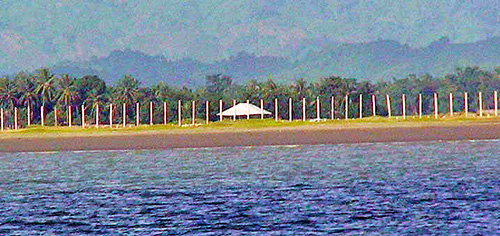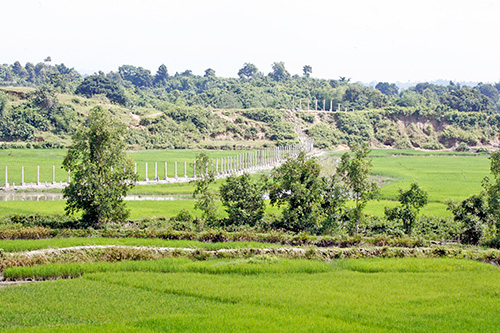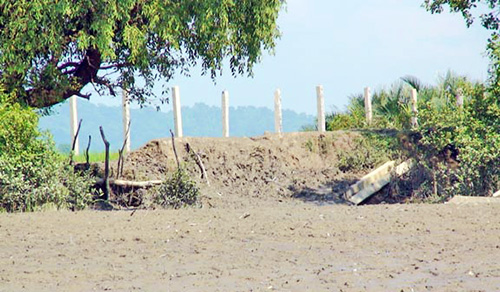Maungdaw, Arakan State: Burma’s border security force - Nasaka of Maungdaw Township, Arakan State, has been using forced labour and collecting money from local villagers since January 27 for erecting barbed wire fencing on the Burma Bangladesh border, said a local elder on condition of anonymity.
The Nasaka has ordered villagers in Maungdaw north on January 27 to carry soil to the bottom of the erected pillars and also make a walkway along the fence. Daily, hundreds of labourers have been carrying soil to the bottom of the pillars and to set up barbed wires.

Every day, about 50 to 60 villagers per village have to go to the work site. They extract forced labour from the villages of Kyauk Hla Gaar, Jambonia, Letpu Pin, Thakay Pyin, Kyauk Pyin Seak, Paung Zaar, Labaw Zaar of Nasaka area No.6 of Maungdaw Township. The villagers have to go to the work site taking their own food. They work from early morning till sun set. Besides, the villagers have to pay Kyat 1,000 to 5,000 per family according to their financial status to the Nasaka for the fence erection, a local farmer from Paung Zaar said.
Similarly, the villagers of Nasaka area No. 5 also provide forced labour for fence construction on the Burma-Bangladesh border since January 19. The Captain of the Nasaka outpost # (12) of Nasaka area No.5 has been controlling the labourers. The villagers of Sali Pyin village, Kular Bill village, Mangala village, Longga Daung village, Myaw Taung village, Rabilla village, Retwin Chaung village, U Shay Kya ( Bora shikdar Para ) of Nasaka area No. 5 of Maungdaw Township have to provide forced labour every day, a local elder from Kular Bill said.
Besides, Major San Win Khine, the Commander of Nasaka area No. 5 has also been collecting Kyat 5,000 per family in his area. The Village Peace and Development Council (VPDC) Chairman Md. Khasim actively participates in collecting money from the villagers. It is different from one Nasaka area number to another in terms of collecting money. It is dependent on Nasaka commanders as he is boss in his area, said a local trader.

Some poor villagers are having difficulties in supporting their family members as they don’t have free time to eke out a living. They have also to provide money to the Nasaka for building barbed wire fence.
Nasaka has resumed construction of the Burma-Bangladesh border barbed wire fence since October 21, 2009, after the rainy season, said a schoolteacher from the locality.
The Nasaka will make an 80-kilometre long fence opposite of--- Rezu and Amtoli to Asat Toli, Sacc Dalar, Pultali and Lemusari (Chittagong Hill Tracts) of Bangladesh.

Earlier, villagers in Maungdaw Township were fleeing from their homes to avoid being rounded up by army for forced labour in fence erection on the Burma–Bangladesh border. A Burmese Army Sergeant U Sein who came to Maungdaw Township earlier and camped in Nagakura village for security and supervision of the fence construction went to the villages to detain villagers to work in the fence construction by promising that they would be paid wages. But, they were not paid, according to a local youth.
Despite international and International Labor Organization (ILO) pressure, the ruling military junta has been using forced labour from people across the country. The junta has declared that there is no forced labour in Burma.
The Arakanese Rohingya boat-people issue in Thailand, Indonesia, Malaysia, India and Bangladesh, were highlighted, especially, after some Arakanese Rohingya boat-people were set adrift in the ocean by the Royal Thai Naval forces with little food and water in boats without engines and oars last January and February 2009. Most of the Arakanese Rohingya boat-people died in the sea and some were rescued by Indian Navy. After that, the Burmese military junta abruptly decided to erect barbed wire fences on the Burma-Bangladesh border though facing acute financial crisis. However, it declared the fence was being constructed to stop smuggling and human trafficking. But, some say that it is not their real motive. It has a secret plan for erecting fence on the border area, said a businessman from Maungdaw Town who declined to be named and a former village Chairman from Maungdaw Town preferring not to be named.



